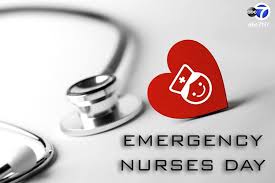Today marks an important milestone for emergency nurses across the country—the 30th anniversary of a national Emergency Nurses Day. The day falls in the middle of national Emergency Nurses Week which runs October 6-12 this year.
The Emergency Nurses Association (ENA) started the tradition back in 1989, long before many of the medical advances in emergency medicine that we take for granted today. But a few things haven’t changed in 30 years. Emergency nurses’ dedication to high-quality patient care in a turbulent, fast-paced, and unpredictable environment remains the foundation of an emergency department’s success.
ED nurses are the ones patients see when they are least expecting it. A trip to the ED is often the most unplanned healthcare situation and is scary for many patients. Emergency nurses use all their nursing skills to assess, diagnose, and care for people who could be in their care for anything from severe trauma from an accident to an injury from a fall to trouble breathing from flu symptoms. They must assess quickly and accurately patients of all ages, demographics, and even those who may be unable to communicate what’s wrong. The pace is rapid and constant.
According to the ENA website, 43,000 members of the association are vocal advocates for emergency department care. They are trained in “triage, patient care, disaster preparedness, and all aspects of emergency care.” Emergency nurses are RNs and they can also obtain credentials as an emergency nurse practitioner certification (ENP-BC). The American Academy of Emergency Nurse Practitioners also offers excellent resources for nursing students or anyone interested in this career path.
Emergency nurses care for patients in their care, but what they do has wide impact. They are also persistent advocates for policies that will protect their patients and also protect those in the profession. In a time when workplace violence against nurses is rising and adding another level of complexity to being an ED nurse, policies and protections are essential to letting nurses continue to offer the level of care their patients need while keeping themselves safe from harm.
Because of the higher levels of stress and the endless trauma they deal with, ED nurses are at particular risk for burnout, stress, and even symptoms of post-traumatic stress disorder. Healthcare organizations that promote wellness and self-care and that make mental health care a priority for nurses in workplaces that routinely deal with trauma cases will build a healthier nursing staff.
But ED nurses also take great satisfaction from being able to help ill or injured patients and offer resources and comfort to their families. They keep their entire suite of nursing skills in use throughout each shift, because they never know what each day will bring. To say the job is never dull is an understatement.
So for all the emergency nurses, this week it’s all about you and all you do to help patients get through their medical emergency and for the ways you offer support to your colleagues in the ED.
- Why Finding a Nursing Community Is Important - May 10, 2024
- A Camp Nurse Volunteer Shares the Joy - April 30, 2024
- Is the FNP Program Right for You? - April 24, 2024



